How to use SerotoninUpdated 22 days ago

Serotonin is your brain’s most important neurotransmitter for emotional stability and well-being. It helps you stay calm, feel content, and cope with daily stress. Serotonin has always been described as the ‘happy chemical’ which isn’t correct. Instead, it is, in fact, a ‘stress-coping chemical’.
Beyond helping you deal with stressful events, serotonin is involved in regulating your sleep patterns, blood flow, appetite, pain sensitivity, and even how your digestive system functions. It’s essential for helping you relax, enjoy restful sleep, and maintain a positive outlook on life.
When serotonin levels are low, you may notice increased nervousness, irritability, or feelings of sadness.
Sleep becomes restless and of shorter duration, cravings for sweets or carbs rise, digestion is sluggish or pain sensitivity is heightened. Additionally, low serotonin makes it harder to handle stress and leaves you feeling more withdrawn and worn out.
Many things can contribute to lower serotonin: chronic stress, insufficient sunlight, poor nutrition, gut imbalances, and genetic variations such as a fast MAO gene.
Conditions like low mood, irritability, sleep issues, hormonal symptoms, compulsive behavior, SIBO, migraines, and irritable bowel syndrome all have links to low serotonin. Interestingly, symptoms after alcohol consumption are associated with low serotonin as well. Keeping serotonin levels balanced is key for emotional health, restful sleep, and overall quality of life.†
How Is Your Serotonin Doing? Check!

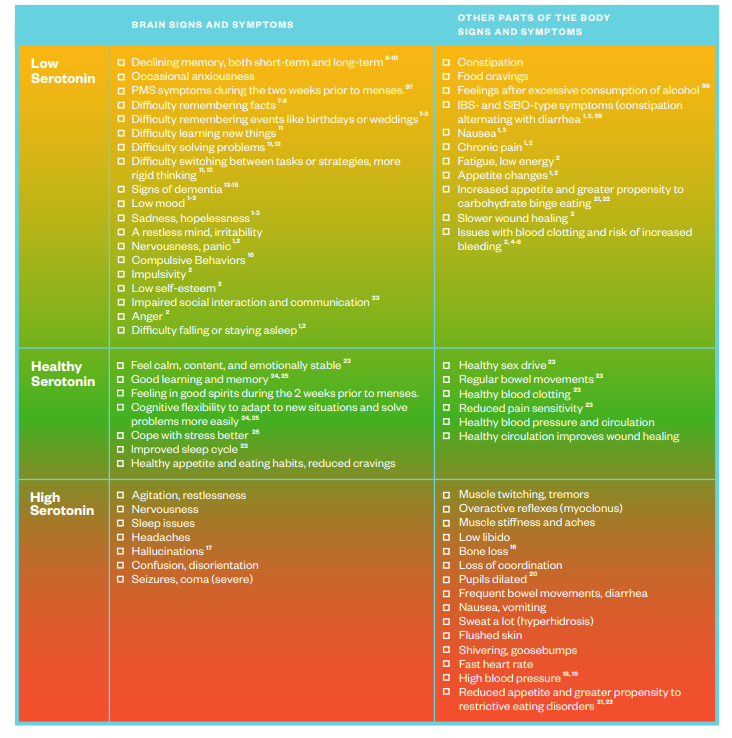
Most people understand, and focus, on the effects of serotonin on the brain. However, the majority of serotonin’s functions are outside of the brain. Serotonin’s main roles are as follows in order of importance:

How to Use Serotonin Nutrients
One may use Serotonin Nutrients any time of day or night but always take it after some food. The duration of Serotonin Nutrients’ effect on the body varies from individual to individual. 
You may open the capsule and use however much you need in a bite of food. Then close the capsule back and store for the next time
For the past couple of years, Dr. Lynch has learned how people typically respond to this supplement. Following these suggestions supports beneficial outcomes.†
Take Serotonin Nutrients to support healthy levels of serotonin. This means that one should take it when there is a need to do so and not every day.†
One customer shared that she at first enjoyed the effects of Serotonin Nutrients, but found that it did not agree with her when she was taking it every day.

That’s very much the case for everyone. Do not take Serotonin Nutrients every day. Take it when you need it. Refer to the graphic below for visually understanding why you cannot take Serotonin Nutrients every day. You can only feel so good when taking a specific supplement. At some point, when you feel great from the supplement, it’s not possible to experience even more benefits. Instead, you’re likely to experience side effects from taking too much.
It’s about supporting your healthy serotonin levels and knowing how you are feeling prior to taking the supplement.
The key is identifying where you are currently, and then evaluating if you need to take a capsule of Serotonin Nutrients at that moment or not.†
How to Use Serotonin Nutrients Generally
The Pulse Method is Dr. Lynch’s method for starting, pausing, or stopping a supplement based on how you’re feeling. Implement this method after consulting with your healthcare practitioner and introducing a new supplement into your diet and after consulting with your doctor. The Pulse Method has helped people reduce side effects, support healthy outcomes, and save money.
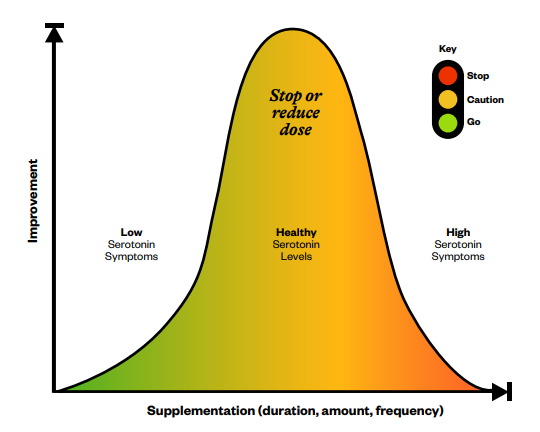 What Does It Mean To Supplement?
What Does It Mean To Supplement?
The word supplement literally means “to add to or enhance.” Supplementation is used to “top off” nutrients you should already receive daily from eating, though sometimes you may not. It is also a tool to aid the body in supporting nutritional balance, which can be offset due to poor food quality and a lack of essential vitamins and minerals.

Real-Life Usage Scenarios
1. A 17 year old takes 1 capsule of Serotonin Nutrients before bed and has noticed healthy sleep.†
2. College students informed Dr. Lynch that after a night of drinking, they would take a Serotonin Nutrients the next morning and they would feel their health supported. After doing some research, Dr. Lynch confirmed that drinking alcohol initially raises serotonin but then there is a big drop in serotonin the following day.†
3. I, Dr. Lynch, take 1 capsule of Serotonin Nutrients each night prior to bed. After doing so, he noticed various changes according to his Garmin Venu 3 watch which tracks various activities like heart rate variability, deep sleep, REM sleep, heart rate to name a few. His sleep score, HRV and lowest resting heart rate were in a healthy range. When he doesn’t take it, he experiences difficulty with his sleep markers.†
4. A 22-year-old college graduate uses 1 capsule of Serotonin Nutrients typically once a day before bed but at times up to three times a day. He notices feeling calm and healthy sleep. He was using just 1 capsule a day but realized that he needs to take it up to three times a day - not always but on some occasions. Dr. Lynch reviewed his StrateGene Report and identified that his serotonin activity is very, very low in his brain which explains this high need. This individual has a reduced ability to make serotonin, has a fast ability to eliminate it, has reduced serotonin transport and reduced serotonin receptor density all leading to reduced serotonin vulnerability.†
5. After ovulation, a 48-year-old woman, Dr. Lynch’s wife, Nadia, uses Serotonin Nutrients to support her healthy mood. Dr. Lynch noticed a consistent drop in mood after ovulation, which is consistent with low serotonin due to a big drop in estrogen. Typically, Nadia would suffer from irritability, mood swings, headaches, impatience and carb binging during this time. For her, Serotonin Nutrients supported healthy serotonin levels, along with healthy mood, absence of headache, and she maintained healthy eating habits.†
6. A woman, of unknown age, reported that, after starting Serotonin Nutrients, she experienced regular and healthy bowel movements.† Dr. Lynch learned of this lady’s success from an online interaction.
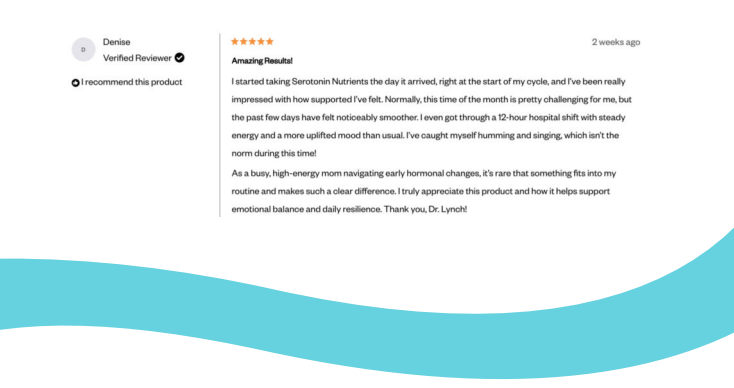 How to Further Optimize Your Serotonin
How to Further Optimize Your Serotonin
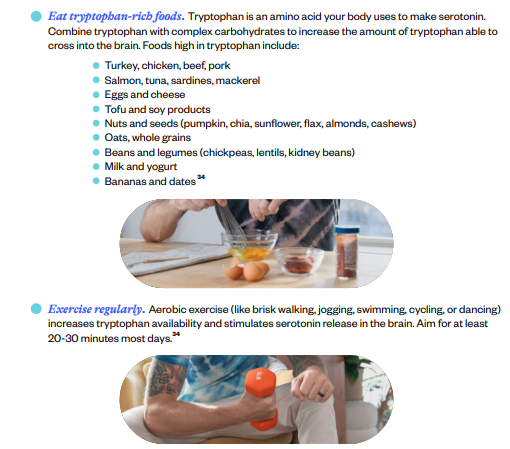
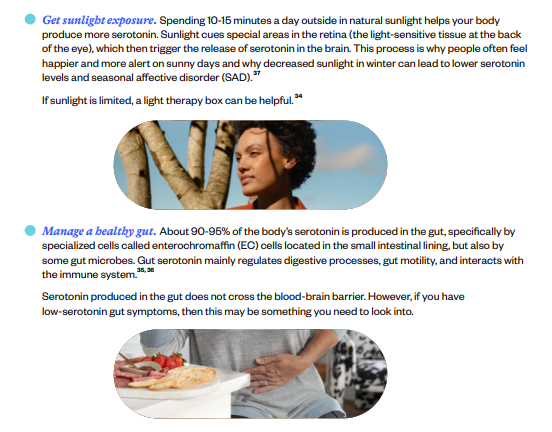
Life Events Associated with Low Serotonin
Mood Disorders and Serotonin: Low Mood and Nervousness
Serotonin is more involved in stress-coping mechanisms than mood directly. However, low serotonin levels are closely linked to the development of mood disorders in those already at risk. Serotonin influences mood regulation, and alterations in its signaling have been consistently observed in individuals with low mood.
Studies using PET scans have shown that people with mood disorders often have fewer serotonin receptors (5-HT1A) and transporters (SERT) in important parts of the brain. This means their brains can’t use serotonin as effectively, which can lead to symptoms of low mood.44,47
Low serotonin makes it harder for the brain to regulate emotions, which is why many treatments focus on increasing serotonin levels.
These same serotonin receptors and transporters impact serotonin function in the prefrontal cortex and the amygdala. The brain becomes more sensitive to threats and less able to caln down after stress. This leads to increased feelings of worry, nervousness, and fear, which are common symptoms of mood disorders.44,47
Sleep Disorders and Serotonin
Serotonin’s involvement in sleep is multifaceted and complex. Serotonin levels are highest when we are awake and lower when we are asleep. However, serotonin is needed to make melatonin.
One case study on an individual with genetically reduced serotonin found that he/she experienced abnormal sleep-wake rhythms, hypersomnia, and disrupted melatonin production. Supplementing with 5-HTP improved sleep patterns, restored melatonin levels, and normalized circadian rhythms. 45,46,47†
At the same time, if you have slow MAOA enzyme function (a dirty MAOA), serotonin may not be broken down as effectively, resulting in higher serotonin levels in the brain. Excess serotonin can lead to symptoms like trouble falling asleep, feeling ‘wired,’ or experiencing intense and vivid dreams. 48,49
 Memory and Serotonin: Cognitive Decline and Dementia
Memory and Serotonin: Cognitive Decline and Dementia
Serotonin acts through specific receptors (5-HTs) found in brain areas like the hippocampus and prefrontal cortex—regions essential for forming memories, attention, and decision-making.50,51
Low serotonin levels or reduced serotonin transporter (SERT) activity are seen in individuals with mild cognitive impairment or early dementia, with poorer memory and greater loss of brain tissue.52-54
Serotonin helps control the growth of new brain cells (neurogenesis) and how flexible the brain is at making new connections (neuroplasticity). It also interacts with other neurotransmitters involved in memory, such as acetylcholine, dopamine, glutamate, and GABA.55-57
Serotonin can increase the release of acetylcholine. Acetylcholine helps you store information in memory for later recall. When serotonin stimulates acetylcholine release, it helps improve memory performance and protects brain cells. This interaction is so important that boosting serotonin activity is being studied as a potential way to help treat memory loss in conditions like Alzheimer’s disease.58,59
Serotonin, dopamine, and acetylcholine don’t work alone—they form a network, each influencing the others. For example, serotonin’s effect on memory can partly depend on how it changes dopamine and acetylcholine levels in the brain. When these chemicals are balanced and working together, memory and thinking skills are usually at their best.
Behavioral Disorders and Serotonin: Aggression and Impulsive Behavior
Serotonin acts as a natural ‘brake’ in the brain. It reduces aggressive and impulsive actions by influencing brain areas involved in emotion and self-control, such as the prefrontal cortex and the amygdala. When serotonin is low, you have more trouble controlling your anger and impulses. This is because the prefrontal cortex (which helps us think before we act) has a harder time calming the emotional responses from the amygdala (which produces feelings like anger and fear).
Serotonin also helps regulate dopamine. Dopamine drives our ‘reward’ and ‘motivation’ behaviors. If serotonin is low, dopamine activity can become too high, which may further increase impulsive and aggressive behaviors. 60-64
 Learning Difficulties and Serotonin
Learning Difficulties and Serotonin
Serotonin helps control the growth of new brain cells (neurogenesis) and how flexible the brain is at making new connections (neuroplasticity). This is important for brain development during early childhood. It builds brain circuits needed for learning, thinking, and controlling emotions. It also interacts with other neurotransmitters such as acetylcholine, dopamine, glutamate, and GABA involved in memory.55-57
Serotonin helps children manage their impulses and emotions, which is important for paying attention and behaving well in class. Healthy serotonin levels are associated with better learning, patience & the ability to handle stress at school. 70,71
Developmental Conditions and Serotonin
Serotonin is involved in regulating social behavior, empathy, and emotional regulation. Individuals with conditions on this spectrum frequently have reduced serotonin synthesis and altered serotonin transporter (SERT) function in the brain. Serotonin imbalances can make it harder for individuals with symptoms on this spectrum to interact socially, understand emotions, and communicate effectively.
Abnormal serotonin signaling, especially increased activation of certain serotonin receptors (like 5-HT2A), has been linked to repetitive and stereotyped behaviors. Blocking these specific serotonin receptors in animal models can reduce repetitive behaviors. 65
Serotonin regulates how the brain processes sensory information, such as touch, sound, and light. Disruptions in serotonin levels may contribute to sensory sensitivities. Many children with developmental conditions that affect how they interact with others, communicate and behave have higher levels of serotonin in their blood but lower serotonin activity in the brain. Serotonin transporters (SERT) affect how much serotonin is available in the brain, influencing their symptoms.66,67
History of Mental Trauma and Serotonin
Individuals with a history of mental trauma often have lower levels of serotonin in their blood and brain compared to those who are resilient after trauma or have not experienced trauma at all. This is linked to common symptoms of trauma, such as hypervigilance, impulsivity, irritability, aggression, low mood, and intrusive memories.
When a person experiences trauma, serotonin is released in the brain to help calm nervous feelings and emotional distress. However, if the trauma is severe or long-lasting, the brain’s serotonin system can become overactivated and eventually depleted. This depletion makes it harder for the brain to regulate stress and emotions, leading to the persistent symptoms seen in trauma-behaviors. 68,69
Serotonin is also important in regulating another neurotransmitter - glutamate. It acts like a “volume controller” and can either turn glutamate up or down to keep levels stable. When serotonin is low, it loses its ability to regulate glutamate, so the amygdala (your brain’s “fear center”) becomes extra sensitive to glutamate. This can make fear or panic reactions stronger and more exaggerated.94,95
Migraines, Headaches, and Serotonin
Serotonin’s effects on migraines are complex and can be both protective and pain-inducing. It often depends on the receptor subtype involved and the timing of serotonin release.
Low serotonin levels can cause blood vessels to dilate, which can trigger migraine attacks. During a migraine, serotonin levels in the blood often fall, and this drop is associated with the onset of headache pain. 77-79
In the brain, normal serotonin levels help prevent migraine headaches, while low levels can make the trigeminovascular system (a key pain pathway in migraines) more sensitive. 5-HT1B and 5-HT1D receptors in the trigeminal nerves play a critical role in migraine pain. When serotonin binds to these receptors, it causes blood vessels to narrow, which reduces pain.80-84
Testosterone in Males and Serotonin
The interaction between testosterone and serotonin is sex-specific.
Testosterone supports serotonin production by enhancing TPH enzyme activity. If you have healthy testosterone levels, you most likely have healthy serotonin levels.
However, excess testosterone increases the number of serotonin reuptake transporters in the brain. These transporters remove serotonin, reducing its availability and activity. This reduction in serotonin leads to low mood, anxiety, and irritability.
When high testosterone is combined with low serotonin, there is a greater risk for maladaptive aggression. Testosterone encourages dominance-seeking behaviors, such as competitiveness (wanting to win) or other alpha-male-type behaviors. Low serotonin makes these individuals more reactive to frustration, increasing the chance of aggressive outbursts.72-76
 Testosterone in Females and Serotonin
Testosterone in Females and Serotonin
The interaction between testosterone and serotonin is sex-specific.
The testosterone baseline differs between biological males and females. A female who takes testosterone and increases her testosterone to that of a typical male, but above the baseline for a female, will have lower serotonin and experience low serotonin symptoms.
This could create the same scenario of high testosterone and low serotonin as that for males.
Estrogen and Serotonin: PMS and Menopause
Estrogen enhances serotonin activity in several important ways. It increases TPH enzyme activity,87 slows down MAOA enzyme activity,86 inhibits its reuptake into nerve cells, and increases receptor sensitivity. This means more serotonin is produced, less is broken down, and more is available to bind and activate responsive serotonin receptors. Women thus produce more serotonin than men and have a higher baseline serotonin.85
Estrogen and progesterone work together to boost serotonin during the luteal phase (2nd phase before the period starts) of the menstrual cycle. This is why many women feel more calm and balanced during this phase. If estrogen and progesterone levels drop too suddenly before the period starts, serotonin levels also drop. This can lead to mood swings, irritability, and low mood. 88-90
Since estrogen fluctuates with menstrual cycles and post-menopause, serotonin levels also fluctuate.
Gut Disorders and Serotonin: Constipation and IBS
Serotonin plays a crucial role in gut health by stimulating the release of acetylcholine (ACh) in the gut. ACh stimulates muscle contractions and promotes digestive enzyme release. Together, serotonin and ACh coordinate rhythmic intestinal movements necessary for regular bowel movements. When there is too much serotonin or ACh in the gut, you experience diarrhea and abdominal cramps. When there is too little serotonin or ACh, digestion slows down, and you experience constipation. These are typical symptoms of IBS.
Serotonin in the gut is primarily regulated by the function of serotonin transporters (SERT), and treatments for IBS often target these serotonin pathways.91-93
Exercise and Serotonin
A recent study 96 on mice compared the effects of exercise and Prozac (an SSRI) on both physical performance and mood. The researchers found that Prozac, especially when combined with exercise, can increase muscle growth and grip strength, demonstrating a clear performance-enhancing effect that is likely due to the increase in serotonin.
However, when it came to improving mood and reducing occasional anxiousness, exercise alone was more effective than Prozac alone. Behavioral tests on the mice showed that exercise had a stronger antidepressant and anti-anxiety effect than Prozac. While Prozac did help with some physical metrics, it was not as good as exercise for improving aerobic capacity or mental health.
The take-home messages are that serotonin has wider physical impacts than just mood alone and that exercise is a superior mood booster to antidepressants. This is most likely because exercise also stimulates dopamine release, another mood-enhancing neurotransmitter.


Interactions with Medications
Do NOT use Serotonin Nutrients if using these medications.
Here are some common medications that contraindicate the use of Serotonin Nutrients. This list is not exhaustive. Talk with your healthcare professional to ensure there are no interactions.
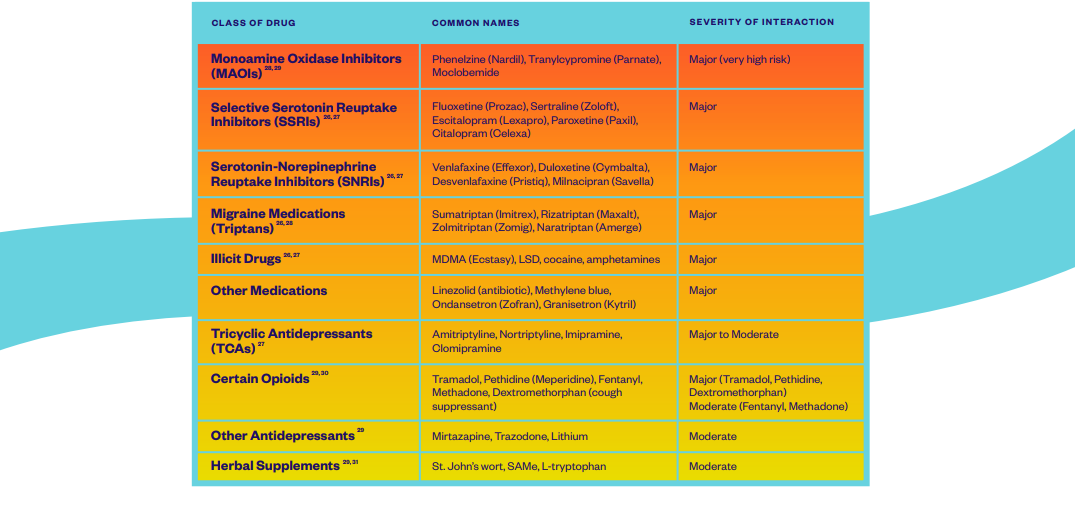
Caution: Blood pressure medications
It’s not contraindicated to use Serotonin Nutrients with blood pressure medications. However, it is essential to be aware of potential interactions. Monitor your blood pressure, and always consult with your healthcare professional about product interactions. If serotonin levels rise too high, it can lead to an increase in blood pressure.
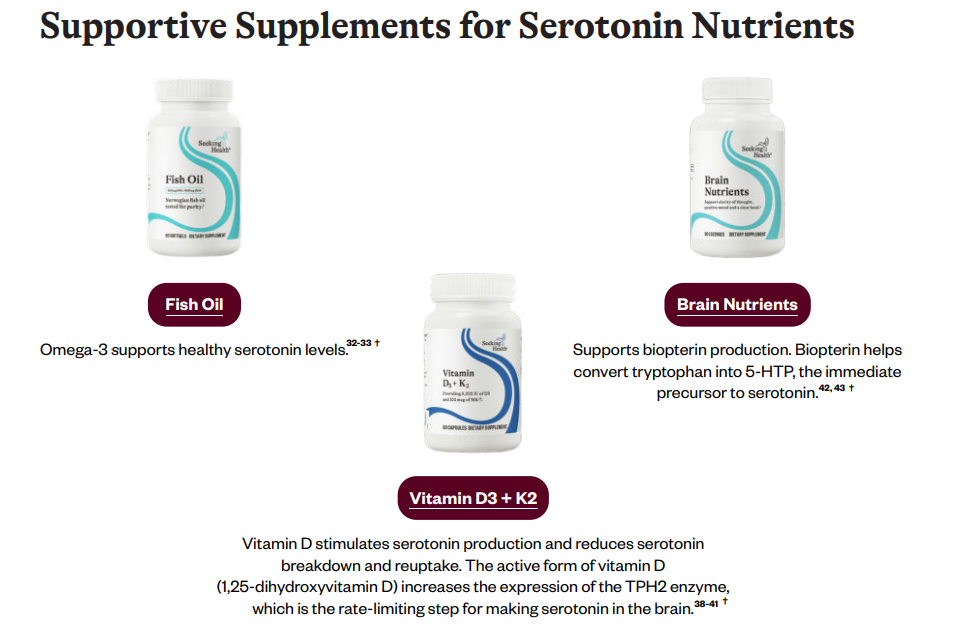 FAQs
FAQs
Do I take this every day?
Serotonin Nutrients should be used on an as-needed basis. Take when you have low serotonin symptoms (in the table above) and need to support healthy serotonin.†
What are the potential side effects of Serotonin Nutrients?
- It’s not really a side effect, but rather an excessive amount of serotonin.
- Common side effects are headaches, irritability, loose stools, and rapid heart rate.
- Not taking as much or as often is usually the solution.
Talk to your healthcare professional if you have any concerns.
Can I take Serotonin Nutrients while pregnant?
- No
- Serotonin Nutrients cannot be used during pregnancy due to the saffron. Saffron may stimulate uterine contractions.
- Use Brain Nutrients and Vitamin D3+K2 instead to support healthy serotonin levels.†
Can I take Serotonin Nutrients while breastfeeding?
- Yes
Can I take Serotonin Nutrients and Histamine Nutrients together?
- Yes
Can I take Serotonin Nutrients and Dopamine Nutrients together?
- Yes.
- However, this is not always necessary since serotonin regulates dopamine. Depending on the receptors serotonin binds to, it can either lower or increase dopamine, depending on what’s needed.
- You still need the ingredients to make dopamine, though. If you don’t have all the ingredients, you may not get the dopamine benefit of serotonin if your dopamine is also low. In this case, taking Dopamine Nutrients will provide some additional support.†
Can I try Serotonin Nutrients with Brain Nutrients, Folinic Acid, or Methylfolate?
- Yes.
- Supporting healthy biopterin levels via Brain Nutrients or various types of folate supports healthy neurotransmission.†
Can I take Serotonin Nutrients if I’m on antidepressants such as SSRIs or SNRIs?
- No. This may raise serotonin too high and can be dangerous
Troubleshooting: Why Serotonin Nutrients May Not Be Working for You
It could be one or more of the following scenarios.
I was on antidepressants for many years.
Long-term use of antidepressants, especially SSRIs, typically results in desensitization of serotonin receptors. This means you may not experience healthy serotonin symptoms even if serotonin levels increase. Receptors can take weeks to months to recover.
I’ve been stressed and under pressure for years because of my job, relationship, or trauma.
Stress stimulates glutamate release in the brain. Long-term stress prevents glutamate from being cleared, resulting in high glutamate levels. Excess glutamate overstimulates serotonin release and serotonin receptor function. Over time, serotonin becomes depleted and receptors become desensitized or ‘numb.’ This results in low serotonin symptoms but also failure to respond when serotonin levels are improved.
- Keep Taking Serotonin Nutrients†
- Add Adrenal Cortex 1 capsule in the morning with some food.†
Why Serotonin Nutrients Makes You Feel Worse
You have low serotonin symptoms, or your test results came back showing low serotonin. You take Serotonin Nutrients, and you feel worse. It doesn’t make sense to you.
However, it could be one or more of the following scenarios
I’m drinking a lot of coffee or consuming a lot of energy beverages.
Long-term use of caffeine can increase serotonin levels, resulting in high serotonin symptoms.
You have high histamine levels.
Histamine shares your MAO enzyme with serotonin. If you increase your serotonin, it also increases the workload for MAO. This may allow histamine to be broken down less efficiently and increase your high-histamine symptoms.
Do this first:
- Support your MAO enzyme function.
- This may include taking Riboflavin if you are low in vitamin B2 since riboflavin is a cofactor for MAO enzymes†
- Avoid smoking or vaping (including passive exposure).
- Take Histamine Nutrients 1-2 capsules a day with food†
- Address the root cause of your high histamine.
- Is it gut-related? Some bacteria either produce histamine, activate the release of histamine, or interfere with DAO enzymes to break down histamine in the gut.
- Is it immune-related? An immune system that’s gone rogue can stimulate the release of histamine, even when it’s not needed.
- Is it hormone-related? Estrogen in females can stimulate more histamine release.
- Are your mast cell membranes not robust enough? Weak cell membranes can make mast cells more sensitive to triggers.
Females: I’m estrogen dominant and suffer from endometriosis/PCOS.
Estrogen increases the release of histamine and adds to the workload of MAO enzymes. On top of that, it also slows down the MAO function.
- Take Histamine Nutrients 1-2 capsules a day with food.†
- Take DIM+I3C 1 capsule a day.†
You have gut dysbiosis.
Some gut bacteria can ‘steal’ your tyrosine or tryptophan (amino acids you get from food) and turn them into ‘false neurotransmitters’ such as tyramine and tryptamine, instead of dopamine and serotonin. Tyramine and tryptamine share the same MAO enzymes as serotonin.
If you increase your serotonin, it also increases the workload for MAO. This may allow tyramine and tryptamine to be broken down less efficiently and make you feel worse.
Do this first
- Address gut dysbiosis.
You are eating too many high-tyramine/tryptamine/histamine foods.
Some foods where bacterial organisms are used in production (such as fermented foods and cured meats) are high in tyramine and tryptamine. Histamine, tyramine, and tryptamine share very similar symptoms.
If you are eating a lot of these foods and you have a slow MAO enzyme, then your symptoms may get worse if you take Serotonin Nutrients, even if you have low serotonin levels.
- Reduce your intake of these foods
You have a slow MAOA.
Your MAOA enzymes have a LOT of jobs to do! It has to break down:
- Dopamine
- Norepinephrine
- Epinephrine
- Serotonin
- Histamine
- Phenethylamine (PEA)
- Tyramine (bacterial)
- Tryptamine (bacterial)
If any of these compounds are too high, then any increase of another compound that MAOA has to deal with, such as Serotonin Nutrients, can make your symptoms worse. The problem worsens if you have genetic variations (SNPs) that render MAOA less efficient.
Read Chapter 8 in Dirty Genes to see if you have a slow MAOA and how to clean it.
I’m under quite a bit of stress at the moment because of your job/relationship issues.
Long-term stress raises norepinephrine levels. Norepinephrine and serotonin share MAOA, MAOB, and ALDH2 enzymes that break them down.
Take Stress Nutrients, Ashwagandha, or Phosphatidyl Serine in the meantime.†
Alternatives to Serotonin Nutrients If Needed
If taking Serotonin Nutrients does not provide you with the results you expected, but you are struggling with low serotonin, consider:
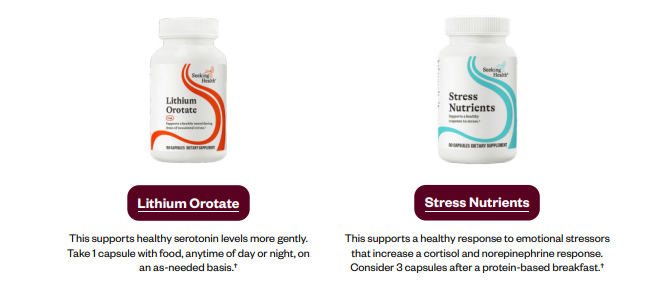
References
1. https://www.medicalnewstoday.com/articles/serotonin-deficiency
2. https://www.healthline.com/health/serotonin-deficiency
3. https://www.healthdirect.gov.au/serotonin
4. https://en.wikipedia.org/wiki/Serotonin
5. https://pubmed.ncbi.nlm.nih.gov/19718472/
6. https://academic.oup.com/cardiovascres/article-abstract/84/2/309/323836?redirectedFrom=fulltext&login=false
7. https://pmc.ncbi.nlm.nih.gov/articles/PMC5399229/
8. https://pmc.ncbi.nlm.nih.gov/articles/PMC5017596/
9. https://pubmed.ncbi.nlm.nih.gov/17481676/
10. https://pubmed.ncbi.nlm.nih.gov/23535352/
11. https://www.medicalnewstoday.com/articles/322263
12. https://www.psych.ox.ac.uk/news/serotonin-booster-leads-to-increased-functional-brain-connectivity
13. https://neurodegenerationresearch.eu/2017/10/lower-brain-serotonin-levels-linked-to-dementia/
14. https://www.hopkinsmedicine.org/news/newsroom/news-releases/2023/12/study-suggests-serotonin-loss-may-contribut e-to-cognitive-decline-in-the-early-stages-of-alzheimers-disease
15. https://pubmed.ncbi.nlm.nih.gov/37718818/
16. https://faseb.onlinelibrary.wiley.com/doi/epdf/10.1096/#.13-246546
17. https://pmc.ncbi.nlm.nih.gov/articles/PMC2996210/
18. https://pmc.ncbi.nlm.nih.gov/articles/PMC6413434/
19. https://pubmed.ncbi.nlm.nih.gov/22407614/
20. https://pmc.ncbi.nlm.nih.gov/articles/PMC5854659/
21. https://pmc.ncbi.nlm.nih.gov/articles/PMC305267/
22. https://pubmed.ncbi.nlm.nih.gov/1752859/
23. https://www.healthdirect.gov.au/serotonin
24. https://en.wikipedia.org/wiki/Serotonin
25. https://pmc.ncbi.nlm.nih.gov/articles/PMC5606297/
References continued
26. https://medlineplus.gov/ency/article/007272.htm
27. https://www.mayoclinic.org/diseases-conditions/serotonin-syndrome/symptoms-causes/syc-20354758
28. https://en.wikipedia.org/wiki/Serotonin_syndrome
29. https://australianprescriber.tg.org.au/articles/opioids-and-antidepressants-which-combinations-to-avoid.html
30. https://www.medsafe.govt.nz/profs/PUArticles/September2022/Opioids-and-serotonergic%20medicines-risk-ofserotonin-syndrome.html
31. https://medlineplus.gov/druginfo/natural/794.html
32. https://pubmed.ncbi.nlm.nih.gov/32407816/
33. https://pubmed.ncbi.nlm.nih.gov/25713056/
34. https://www.medicalnewstoday.com/articles/322416
35. https://pmc.ncbi.nlm.nih.gov/articles/PMC6469458/
36. https://pmc.ncbi.nlm.nih.gov/articles/PMC5526216/
37. https://pubmed.ncbi.nlm.nih.gov/12480364/
38. https://pubmed.ncbi.nlm.nih.gov/25713056/
39. https://www.frontiersin.org/journals/physiology/articles/10.3389/fphys.2023.1152958/full
40. https://faseb.onlinelibrary.wiley.com/doi/epdf/10.1096/#.13-246546
41. https://onlinelibrary.wiley.com/doi/10.1002/hsr2.2276
42. https://en.wikipedia.org/wiki/Tetrahydrobiopterin
43. https://www.sciencedirect.com/topics/agricultural-and-biological-sciences/tetrahydrobiopterin 44. https://pmc.ncbi.nlm.nih.gov/articles/PMC4293164/
45. https://pmc.ncbi.nlm.nih.gov/articles/PMC2831424/
46. https://www.sciencedaily.com/releases/2019/06/190624173822.htm
47. https://pubmed.ncbi.nlm.nih.gov/17984558/
48. https://pmc.ncbi.nlm.nih.gov/articles/PMC7520887/
49. https://pubmed.ncbi.nlm.nih.gov/21459634/
50. https://pubmed.ncbi.nlm.nih.gov/10821328/
51. https://pmc.ncbi.nlm.nih.gov/articles/PMC5017596/
52. https://neurodegenerationresearch.eu/2017/10/lower-brain-serotonin-levels-linked-to-dementia/
53. https://pmc.ncbi.nlm.nih.gov/articles/PMC6594906/
54. https://www.psychiatrictimes.com/view/mild-cognitive-impairment-and-serotonin-system-degeneration
55. https://pmc.ncbi.nlm.nih.gov/articles/PMC11654273/
56. https://pubmed.ncbi.nlm.nih.gov/10821328/
57. https://www.frontiersin.org/journals/pharmacology/articles/10.3389/fphar.2015.00143/full
58. https://pmc.ncbi.nlm.nih.gov/articles/PMC5017596/
59. https://pmc.ncbi.nlm.nih.gov/articles/PMC3371373/
60. https://pmc.ncbi.nlm.nih.gov/articles/PMC2612120/
61. https://www.tutor2u.net/psychology/reference/aggression-neurotransmitter-serotonin
62. https://www.cam.ac.uk/research/news/serotonin-levels-affect-the-brains-response-to-anger 63. https://www.nature.com/articles/npp2013351
64. https://bbrfoundation.org/content/impulsivity-and-aggression-affected-differently-serotonin-receptors
65. https://www.frontiersin.org/journals/neuroscience/articles/10.3389/fnins.2022.919890/full
66. https://pmc.ncbi.nlm.nih.gov/articles/PMC4824539/
67. https://pmc.ncbi.nlm.nih.gov/articles/PMC6118182/
68. https://pmc.ncbi.nlm.nih.gov/articles/PMC9779530/
69. https://www.mdpi.com/2079-7737/12/8/1050
70. https://pmc.ncbi.nlm.nih.gov/articles/PMC5310545/
71. https://pubmed.ncbi.nlm.nih.gov/39004411/
72. https://pmc.ncbi.nlm.nih.gov/articles/PMC4330791/
73. https://journals.plos.org/plosone/article?id=10.1371%2Fjournal.pone.0126462
74. https://www.hcplive.com/view/testosterone-supplementation-may-increase-serotonin-levels-in-the-brain
References continued
75. chrome-extension://efaidnbmnnnibpcajpcglclefindmkaj/https://www.ima.org.il/filesupload/imaj/0/54/27288.pdf
76. chrome-extension://efaidnbmnnnibpcajpcglclefindmkaj/https://dergipark.org.tr/en/download/article-file/1104827
77. https://pmc.ncbi.nlm.nih.gov/articles/PMC4117050/
78. https://www.frontiersin.org/journals/molecular-neuroscience/articles/10.3389/fnmol.2024.1355281/full
79. https://pubmed.ncbi.nlm.nih.gov/17970989/
80. https://pmc.ncbi.nlm.nih.gov/articles/PMC4117050/
81. https://www.frontiersin.org/journals/molecular-neuroscience/articles/10.3389/fnmol.2024.1355281/full
82. https://pubmed.ncbi.nlm.nih.gov/17970989/
83. https://journals.sagepub.com/doi/10.1177/0333102416640501
84. https://pmc.ncbi.nlm.nih.gov/articles/PMC5848843/
85. https://pubmed.ncbi.nlm.nih.gov/11906203/
86. https://pubmed.ncbi.nlm.nih.gov/874483/
87. https://pubmed.ncbi.nlm.nih.gov/16458260/
88. https://pubmed.ncbi.nlm.nih.gov/20528302/
89. https://www.frontiersin.org/journals/neuroscience/articles/10.3389/fnins.2014.00380/full
90. https://www.frontiersin.org/journals/neuroscience/articles/10.3389/fnins.2015.00037/full
91. https://pmc.ncbi.nlm.nih.gov/articles/PMC7505258/
92. https://pmc.ncbi.nlm.nih.gov/articles/PMC1574906/
93. https://pubmed.ncbi.nlm.nih.gov/16611266/
94. https://pmc.ncbi.nlm.nih.gov/articles/PMC2430669/
95. https://www.nature.com/articles/tp201366
96. https://pubmed.ncbi.nlm.nih.gov/31278948/
97. https://www.saintlukeskc.org/health-library/understanding-pms-and-your-cycle
98. https://www.healthline.com/health/mental-health/depression-after-drinking#causes
99. https://sibo-academy.de/en/blog/beitraege_sibo/sibo-and-mental-h
 †These statements have not been evaluated by the Food and Drug Administration (FDA). This product is not intended to diagnose, treat, cure, or prevent any disease
†These statements have not been evaluated by the Food and Drug Administration (FDA). This product is not intended to diagnose, treat, cure, or prevent any disease